Women, Participation, and WILPF's 16 Days Campaign
This 131 edition of PeaceWomen ENews features updates on the Open Debate on Women, Peace, and Security, the 16 Days Campaign, a statement on the DRC Elections from WILPF DRC,and women, peace and security news, events and resources from peacewomen.org.
If you have any difficulty reading this newsletter in HTML, please view it online.
On October 28 2011, the UN Security Council held its annual Open Debate on Women, Peace and Security with 64 speakers. The civil society speaker, Ms. Orzala Ashraf from Afghanistan, delivered a statement on behalf of our coalition, the NGO Working Group on Women, Peace and Security (NGOWG). She remarked that “it is particularly frustrating that we are repeatedly marginalized, despite the many national and international commitments already made to include us at the decision-making table,” and called for three urgent steps that the UN and its Member States must take:
- Increasing women's role in the prevention of conflict,
- Fulfilling women's right to participate in decisions regarding the future of their countries, inclusion in peace processes and,
- Ensuring women's equal rights are fundamental in peace accords and all political settlements.
PeaceWomen, as always, tracked and analyzed the statement through our Security Council Monitor initiative. The closed negotiation of the Council resulted in the adoption of the Presidential Statement S/PRST/2011/20 (a non-binding political statement). Unfortunately, this Statement does not add any substantial new elements and represents a weak use of the presidential statement function. See our Debate Watch Summary here. 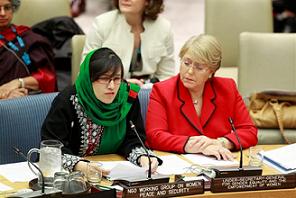
Historic presidential and legislative elections are scheduled to take place in the Democratic Republic of Congo (DRC) on November 28, 2011. The WILPF section in DRC, lead by Annie Matundu Mbambi, has been working with partners to prepare for the election for several months and at this important time we send our sisters in DRC our solidarity. WILPF-DRC is planning public education seminars to be held in 4 provinces of DRC focusing on the upcoming election and promoting women's participation. See article in this month's enews on DRC.
From DRC to Sweden to Pakistan, WILPF members and sections will unite to participate in the annual 16 Days of Action against Gender Violence campaign, which takes place from November 25th to December 10th, 2011. The theme – Challenge Militarism - is so timely and relevant for our work in WILPF. 16 WILPF national sections representing all regions around the world will take part in the campaign and engage in the common agenda to call for the reduction of military spending, the redefining of security and for the challenging of those profiting from conflict.
The news this month includes updates from North Africa, and various regions in Africa, South East Asia, and more. It includes information about women's rights in the Arab Spring, updates about the women's movement in Afghanistan, and violations against women in the Congo and Uganda. Women's political participation on a global level is a noticeable trend in this month's news. Our month's featured resources include a focus on women's issues in the UN system, including resources on the Open Debate, and a report focused on the particular challenges faced by women in the Horn of Africa.
Call for Action: The 16 Days of Activism Against Gender Violence
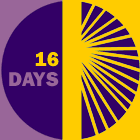 16 Days of Action against Gender Violence is a global campaign initiated by the Center for Women's Global Leadership (CWGL) and will take place from November 25th to December 10th, 2011.
16 Days of Action against Gender Violence is a global campaign initiated by the Center for Women's Global Leadership (CWGL) and will take place from November 25th to December 10th, 2011.
In 2011, the WILPF 16 days for Action Campaign will center around the slogan “Blow the Whistle to Redefine Security”. During the 16 days Campaign, WILPF will be calling for the reduction of military spending, the redefining of security, and for the challenging of those profiting from conflict.
DRC: Public education seminars will be held in 4 provinces of DRC and outreach activities focusing on the upcoming election and promoting women's participation will be conducted in each of the WILPF branch locations. WILPF DRC will also be holding seminars to address SCR 1325 and to provide education on the linkage between violence against women and violence in society with participants given the opportunity for exchange with women political candidates.
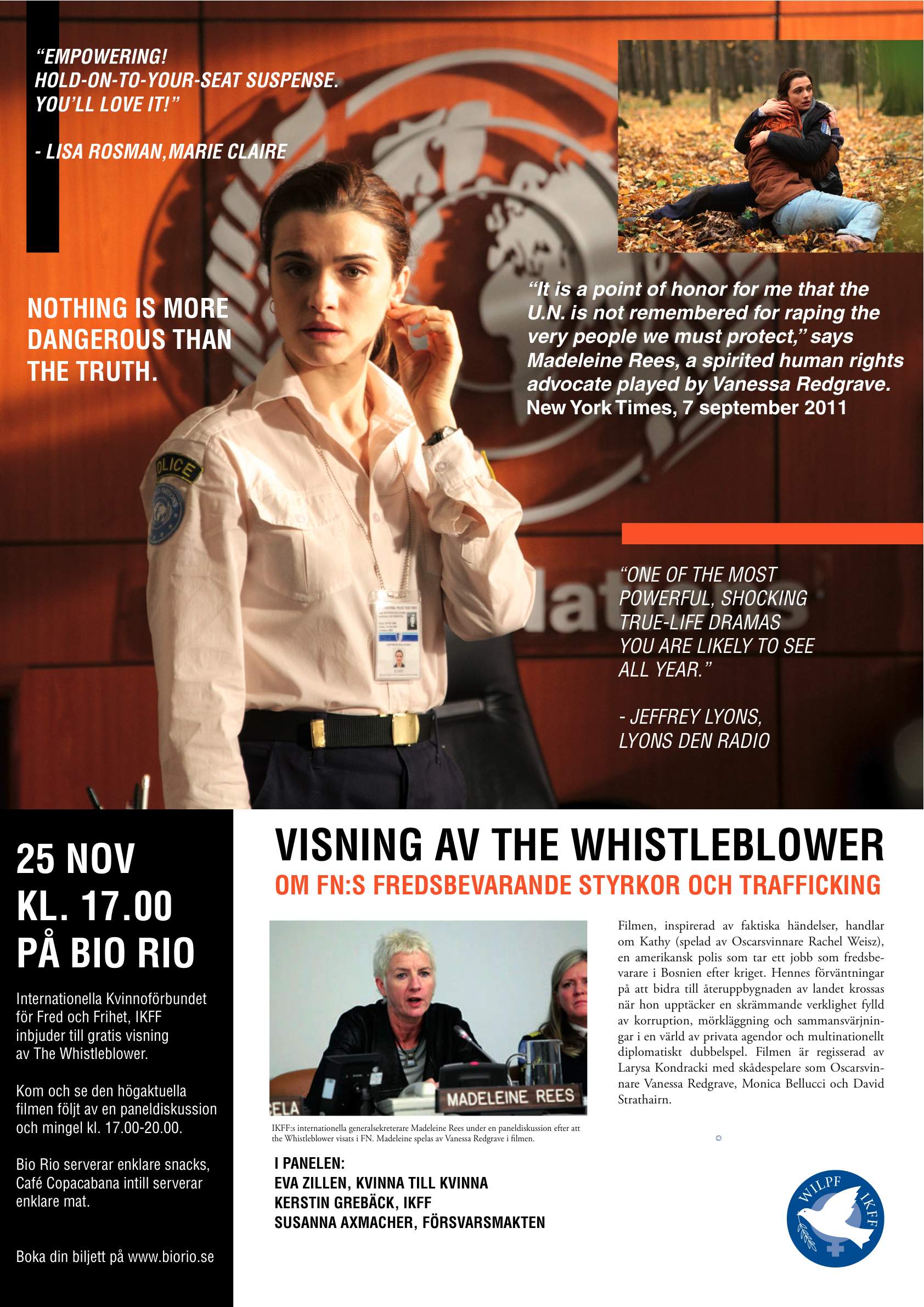 Sweden: In Sweden a screening of the Whistleblower will be held on the 25th of November with a seminar on Impunity to take place on 5th of December.
Sweden: In Sweden a screening of the Whistleblower will be held on the 25th of November with a seminar on Impunity to take place on 5th of December.WILPF International will be holding a conference in Geneva on December 1st and 2nd. The aim of this two-day conference is to bring together experts in different branches of international law to discuss new strategies and advocacy opportunities to advance the protection and promotion of human rights. The conference will involve discussions on how different legal instruments fail to interconnect.
UK: The UK Section of WILPF will convene a conference on Violence Against Women in Peace and War in Leicester on November 26, participate in Reclaim the Night in London, and take part in the Autumn Seminar: Challenge Militarism held by the Amnesty Human Rights Action Centre on December 3rd.
India: The upper house of the Indian Parliament, has appointed a committee under one Member of Parliament to look at making changes to particular legislation aiding women victims of inter-familial violence. Added in 1983, this legislation provides an opportunity for Indian Women to access their rights in this area and has been a key component of rights legislation since 1983. The Indian 16 days campaign will be focused on fighting to have the legislation retained, as section 498-A of Indian Penal Code.
Nigeria: The Nigerian section of WILPF proposes to run a seminar on Women, Peace, and Security from the Nigerian perspective. We hope to look at the total picture of peace and security, what it means to the average Nigerian woman, the role of Nigeria's diverse culture in relation to 1325, and how it can be effectively used to promote and protect the rights of wome
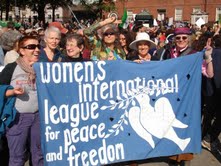 n.
n.
USA: The US section of WILPF has outlined three main actions to be carried out during the 16 days campaign. Firstly U.S.WILPF members have been encouraged by national office to organize whistle blowing demonstration at their local municipal buildings or Occupy movements to draw attention to the dangers of militarism and war culture that perpetuates violence against women. Secondly, participants are being encouraged to record short videos of themselves and other attendees answering the questions “What does security mean to you?”. Finally, participants are being encouraged to complete WILPF's online Call to Action survey.
Pakistan:The Pakistan section of WILPF has developed a series of initiatives for the 16 days campaign, which will include their holding of an event for every day of the campaign. Some of the highlights include participation on November 25 in a joint event, hosted by UNWomen in Islamabad to inaugurate the 16 days campaign, a visit to a women's IDP camp near Peshawar on November 28, a session with local police on EVAW to be held on the 6th of December, the running of aseminar to demand inclusion of women in District Peace Committees on December 7th and finally a Press Briefing on 10 December to highlight the work of WILPF and that of the 2011 Nobel Peace Prize recipients.
To view the rest of WILPF Sections plans for the 16 Days Campaign, visit our website.
Open Debate on Women, Peace, and Security the 11th Anniversary
PeaceWomen attended the session and monitored the statements of the countries that took the floor.
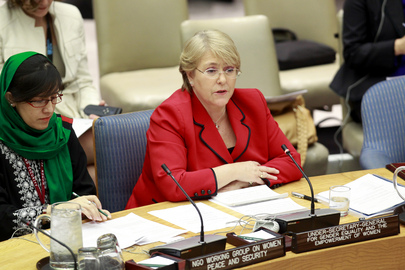
The theme of the debate was “Women's Participation and Role in Conflict Prevention and Mediation". The annual Secretary-General Report on Women, Peace, and Security (S/2011/598) provided details on implementation of SCR 1325 over the last year and for the first time included information on a set of global indicators. The Report also contained Good Recommendations (see part V of Report) as well as an outline of the UN Strategic Framework on WPS to guide United Nations' implementation of the resolution up to 2020 and to strengthen UN system accountability (see annex of Report). The closed negotiations of the Council resulted in the adoption of the Presidential Statement S/PRST/2011/20.
To view analysis of all statements, please the PeaceWomen website here.
November MAP
In the most recent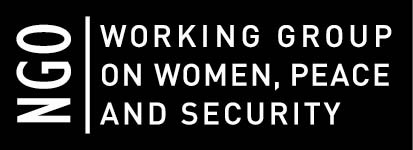 NGOWG WPS MAP updates on country situations of Bosnia and Herzegonvina, Burundi, the Democratic Republic of the Congo, Libya, Myanmar, and Somalia.
NGOWG WPS MAP updates on country situations of Bosnia and Herzegonvina, Burundi, the Democratic Republic of the Congo, Libya, Myanmar, and Somalia.
For the 11th anniversary, the primary focus for the UN and Member States was “Women's Participation and Role in Conflict Prevention and Mediation”. Certainly, this is in area that we in the NGOWG have highlighted as a crucial area of the Women, Peace and Security agenda in which we have seen less than sufficient implementation. The NGOWG highlighted this theme, particularly the example of Afghanistan, by bringing a delegation of women's rights advocates to New York and by engaging in the preparations for the Open Debate. The delegation included Orzala Ashraf Nemat and Nilofar Sakhi. Throughout all of these advocacy efforts, we consistently stress the key messages that we hold at the core of our work in the NGOWG: that women's agency is at the core of all efforts to create and maintain international peace and security and that there must be accountability for violations of women's rights.
- Statement in the UN Security Council Open Debate
- Letter to Ambassadors regarding Open Debate
- Panel on “Women, Peace and Security in Afghanistan”: Co-hosted by the NGOWG, the Mission of Finland and the Mission of Turkey, 26th October, 1-3 on the 2nd floor of the Church Center
- Screening of “Peace Unveiled”: Co-hosted by Institute for Inclusive Security, WILPF, NGOWG, and UN Women, 27th October, 6.30-8.30, 2nd Floor of the Church Center
- Security Council Open Debate on Women, Peace and Security: Orzala Ashraf Nemat presented the NGOWG statement
DRC Elections
The historic presidential and legislative elections in the Democratic Republic of Congo (DRC) are scheduled for November 28, 2011. WILPF section in DRC, lead by Annie Matundu Mbambi, has worked for several months demanding the equal participation of women in all aspects of the election cycle and the assurance for peaceful, fair, and democratic elections. At this important time, we send to our sisters in DRC our solidarity.
WILPF signed on a statement with various regional and international NGOs calling for urgent measures to prevent escalating violence expressing, “concern about the high political tension and deteriorating security situation”. We jointly call upon, “all Congolese and international actors involved to take urgent measures to prevent electoral violence, better protect civilians and ensure credible, free, and fair elections.”
According to Carter Centre “approximately half of registered Congolese voters are women. Congolese political parties however are characterized by low numbers female candidates and other party leadership roles. The only female presidential candidate's application was removed before confirmation of the final list of candidates. In 2006, four of 33 presidential candidates were women. Proportional representation systems are considered to benefit the inclusion of women into the legislative branch, however not more than 12% of legislative candidates in this election are women. There is no formal mechanism in place to improve the involvement and participation of women in politics, though consideration of gender is incorporated into various laws and institutional guidelines.”
WILPF DRC and PeaceWomen continue to monitor and advocate against the lack of justice and accountability in DRC. We recently sent an advocacy letter to all members of the Security Council regarding the latest UN Secretary-General's Report on the Democratic Republic of Congo (S/2011/656) to follow-up on the mass rapes and attacks which took place in Fizi region in June (please see NGOWG statement on the incident). We sent this letter before a closed briefing of the Security Council with the Special Representative of the Secretary-General to the DRC. We called on Council members to ask questions regarding the Fizi attacks and MONUSCO's reaction to the failure of the Government to suspend and detain Colonel Kifaru, and the related investigations.
Other news and resources on DRC:
November 11, 2011 (New York Times)CONGO: An Unruly Election Campaign Mirrors Congo's Lingering Political Instability
First Carter Center Pre-Election Statement on Preparations in the Democratic Republic of Congo, The Carter Center , November 2011
UNITED STATES/CONGO: Congress Urges Obama to Appoint Envoy For Congo ,Campaign , November 2011
September 12, 2011 (Amnesty International )
DRC: From Occasional Outrage to Sustained Response - The Need for the Human Rights Council to Play a Role in Judicial Reform and the Fight Against Impunity
